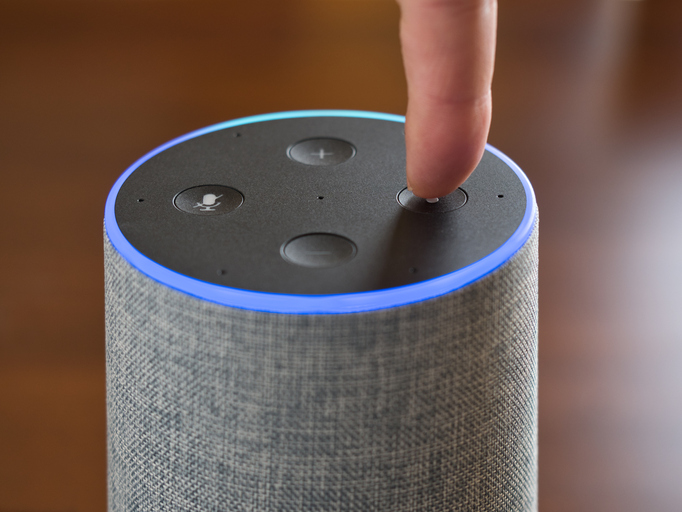If You’re Trying To Eat Healthier – Let Your Smart Speaker Help!

By Joy Stephenson-Laws, JD, Founder
Originally published by Sixty and Me
We probably have all witnessed friends and family asking an invisible “Alexa,” “Siri,” “Bixby” or “Google” to play some music or tell them the weather and wondering who in the world they were talking to.
They were, of course, talking with their “smart speakers,” one of the latest and more popular technology accessories for the home. In addition to playing music (which is what I had originally thought they were limited to), they also can provide access to a wealth of information as well as control other “smart” devices in your home.
According to recent research, more than 8 million baby boomers – more than 10 percent of us – own smart speakers, and this number is increasing. There is a variety of brands available at different price points. The majority are multilingual so if you feel more comfortable speaking in your native language, the smart speakers will have no problem understanding you.
Given my passion for good nutrition as the basis for a healthy life, I wondered if these smart speakers (also known as digital assistants) would do as good a job of helping me create a healthy lifestyle as they do with playing my favorite music. It turns out that the answer is a resounding “Yes!”
There are four key areas where I see “smart speakers” could help us with our healthier diet and lifestyle plans.

Benjamin Franklin famously said, “If you fail to plan, you are planning to fail.” This is perhaps nowhere truer than with trying to have a healthier diet and lifestyle. Smart speakers are a great tool for helping us not only plan but in sticking to the plan. They can do this by providing information about a wide variety of foods and their nutritional value, including important data such as:
- Calories
- Sugar
- Protein
- Sodium
- Total fat and types of fat
- Specific vitamins or minerals
- Glycemic index
Some also give you the option of asking for the nutritional value of various dishes rather than their component foods. For example, you could ask about a dish such as chicken soup, meatloaf or chocolate cake. This can help you better plan meals to make sure they are balanced and as nutrient rich as possible.
It also is great for meal planning if you are on any type of restricted food plan, for example, one to help manage diabetes or high blood pressure. Some are so sophisticated that you can also ask for suggestions on healthy snacking or which foods contain the nutrients that you specifically are looking for. For example, “which foods are high in calcium?”
Depending on which smart speaker you have in your kitchen (which is where many people locate them), you may even be able to ask how long certain foods will keep before they lose their freshness and nutritional value.
Armed with this information, you can go a step further and ask the device to remind you “it’s time to use the chicken before it goes bad.” Since I hate having food spoil, I recently used mine to tell me when the avocados I purchased would be ready to eat.
ShoppingOne of the more convenient and time-saving features of smart speakers is automatically creating a list of products you will need to prepare a specific recipe. Again, the extent of this ability will depend on which smart speaker you have, but, at the very least, you can use it to find a recipe you may like and then tell it to add the ingredients to your shopping list.
Food Preparation/Cooking
I am a big believer in cooking the food that my family and I eat. This is the best way to know and control what we are eating, how it is prepared and the portions on our plates. I also love variety to keep things interesting, which is why I am always on the lookout for new – and healthier – ways to prepare our meals.
It turns out that smart speakers are great for giving me ideas and then for guiding me with instructions and tips on how to bring the different recipes to life. To that end, some even have screens that can show me how to do every step of the recipe (and how it should look).
Depending on which device you have and how you have it configured, your smart speaker can help with:
- Suggestions on healthy meal ideas based on your preferences along with how to follow the recipes
- Ideas for different ways to prepare favorite dishes
- How to swap one ingredient for another (perhaps a healthier one) for a given recipe
- Ideas for healthier snacks/meals based on what you have around the house (for example, I asked what I could do with cheese and apples, and it gave me a recipe for grilled apple/cheese sandwiches)
Healthier Lifestyle
Dietary choices are only one half of the equation for getting and staying healthier. The other is the lifestyle choices that we make. Remember you can easily undo all the health benefits of eating and preparing fresh nutritious food if you fail to get enough sleep, exercise, hydration or if you’re stressed or indulge in such things as smoking or drinking too much alcohol.
Luckily, smart speakers can also help you here as well by:
- Providing ideas for different exercises, ranging from yoga to resistance training, and even guiding you through them and tracking your progress (your model may also integrate with your various health apps such as your step tracker).
- Reminding you to drink water at set intervals throughout the day and keeping track of how much you are drinking.
- Making recommendations on different types of meditation and breathing exercises to reduce daily stress.
- Offering a variety of sounds and music tracks to promote healthier sleep. (I am especially fond of the “rain” sound.)
While smart speakers and other digital health tools are great ways to be more proactive about eating and living healthier, they should never be a substitute for talking with your personal doctor or another competent healthcare practitioner about what makes the most sense for you.
I would also recommend talking with them about getting a comprehensive nutrient test as part of your annual physical. This will help you make sure you are doing all you can to give your body the nutrients it needs – and in the right amounts – to be your healthiest.
Do you have any type of smart speaker or digital assistant in your home? If so, do you ever use it to help you plan healthier meals? How about for helping you keep your exercise or other healthy lifestyle goals? If you don’t have one, are you thinking about getting one? If so, what will you use it for? Please join the conversation.
Let's Have a Conversation!
Joy Stephenson-Laws is the founder of Proactive Health Labs, a national non-profit health information company that provides education and tools needed to achieve optimal health. Her most recent book is Minerals – The Forgotten Nutrient: Your Secret Weapon for Getting and Staying Healthy, available through Amazon, iTunes and bookstores.







